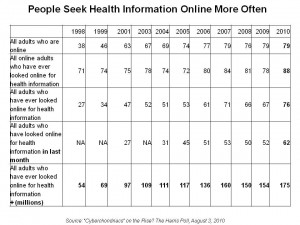 It’s not news that most Americans seek health information online; 9 in 10 do so, and that number plateaued in the past few years. What is news, though, is that people are seeking health information more frequently. 1 in 3 Americans looks online for health information often, compared with just over 1 in 5 just one year ago.
It’s not news that most Americans seek health information online; 9 in 10 do so, and that number plateaued in the past few years. What is news, though, is that people are seeking health information more frequently. 1 in 3 Americans looks online for health information often, compared with just over 1 in 5 just one year ago.
The Harris Poll conducted in July discovered that health information seekers are more intense than ever. On average, so-called Cyberchondriacs seek health info 6 times a month.
And they’re pretty satisfied with the information they’ve found. Only 9% say their searches have been unsuccessful.
Over one-half of health information seekers say they’re discussing the information they’re finding online with their doctors.
HarrisInteractive polled 1,066 U.S. adults between July 13 and 18, 2010.
Health Populi’s Hot Points: The growth in the ‘intensity’ of health information seeking has been dramatic in the past year, based on The Harris Poll’s findings. Several factors may have contributed to this:
- Consumers are paying more out of pocket health costs, which is driving health shopping behavior, cost-comparisons, and the search for therapeutic alternatives.
- Health reforms of the Patient Protection and Affordability Act (PPACA) kick in and inquiring health citizens’ minds want to know how health reform impacts them up-close-and-personal.
- More FDA prescription drug and over-the-counter recalls have hit the mainstream press over the past year, compelling Moms, caregivers, and patients to learn more about the medical products they’re consuming.
- Mobile health has really taken off in the past year, with more health citizens accessing health information via mobile, and more joining health-oriented social networks. The mobile Internet brings more immediacy, and may drive more frequent health info-connections.
There is an important caveat on self-driven health searching online: that is, that most people are quite satisfied with what they’re finding online. Susannah Fox of the Pew Internet & American Life Project has found that few health info seekers online check the sources of the information. That’s not responsible health citizenry: knowing where health advice comes from is part of being a full-on, empowered patient.




 Thank you, Trey Rawles of @Optum, for including me on
Thank you, Trey Rawles of @Optum, for including me on  I was invited to be a Judge for the upcoming
I was invited to be a Judge for the upcoming  For the past 15 years,
For the past 15 years,